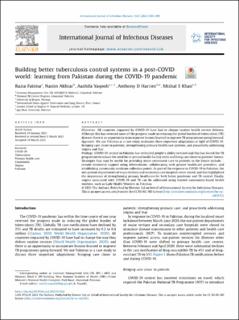| dc.contributor.author | Fatima, Razia | |
| dc.contributor.author | Akhtar, Nasim | |
| dc.contributor.author | Yaqoob, Aashifa | |
| dc.contributor.author | Harries, Anthony D. | |
| dc.contributor.author | Khan, Mishal S. | |
| dc.date.accessioned | 2022-01-24T09:47:29Z | |
| dc.date.available | 2022-01-24T09:47:29Z | |
| dc.date.created | 2021-09-14T18:13:12Z | |
| dc.date.issued | 2021 | |
| dc.identifier.issn | 1201-9712 | |
| dc.identifier.uri | https://hdl.handle.net/11250/2838882 | |
| dc.description.abstract | Objectives
All countries impacted by COVID-19 have had to change routine health service delivery. Although this has reversed some of the progress made in reducing the global burden of tuberculosis (TB) disease, there is an opportunity to incorporate lessons learned to improve TB programmes going forward.
Approach
We use Pakistan as a case study to discuss three important adaptations in light of COVID-19: bringing care closer to patients; strengthening primary health care systems; and proactively addressing stigma and fear.
Findings
COVID-19 control in Pakistan has restricted people’s ability to travel and this has forced the TB programme to reduce the need for in-person health facility visits and bring care closer to patients’ homes. Strategies that may be useful for providing more convenient care to patients in the future include: : remote treatment support using telemedicine; collaborating with private healthcare providers; and establishing community medicine collection points. As part of the response to COVID-19 in Pakistan, the out-patient departments of major tertiary and secondary care hospitals were closed, and this highlighted the importance of strengthening primary healthcare for both better pandemic and TB control. Finally, stigma associated with COVID-19 and TB can be addressed using trusted community-based health workers, such as Lady Health Workers in Pakistan. | en_US |
| dc.language.iso | eng | en_US |
| dc.publisher | Elsevier | en_US |
| dc.rights | Attribution-NonCommercial-NoDerivatives 4.0 Internasjonal | * |
| dc.rights.uri | http://creativecommons.org/licenses/by-nc-nd/4.0/deed.no | * |
| dc.title | Building better tuberculosis control systems in a post-COVID world: learning from Pakistan during the COVID-19 pandemic | en_US |
| dc.type | Journal article | en_US |
| dc.type | Peer reviewed | en_US |
| dc.description.version | publishedVersion | en_US |
| dc.rights.holder | Copyright 2021 The Authors | en_US |
| cristin.ispublished | true | |
| cristin.fulltext | original | |
| cristin.qualitycode | 1 | |
| dc.identifier.doi | 10.1016/j.ijid.2021.03.026 | |
| dc.identifier.cristin | 1934317 | |
| dc.source.journal | International Journal of Infectious Diseases | en_US |
| dc.source.pagenumber | S88-S90 | en_US |
| dc.identifier.citation | International Journal of Infectious Diseases. 2021, 113, Supplement 1, S88-S90. | en_US |
| dc.source.volume | 113 | en_US |
| dc.source.issue | Supplement 1 | en_US |

